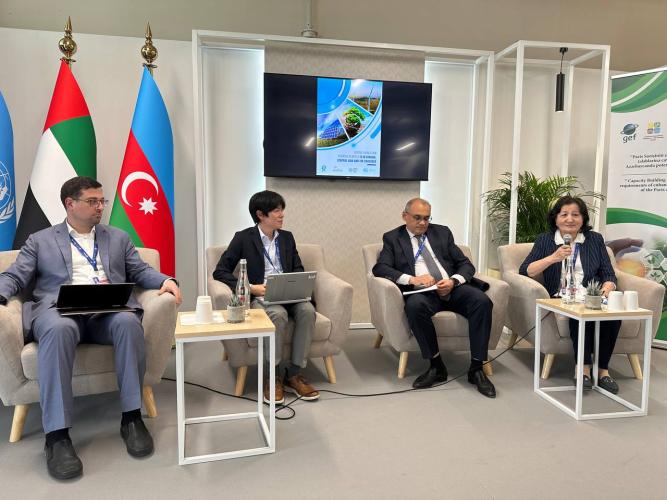The Side-Event "Lessons Learned from Reporting on Article 13 within the MLP programme in Eurasia, Central Asia and the Caucasus" took place on December 4th, 2023 in Azerbaijan Pavilion, COP-28, Dubai, the UAE.
Key take-away messages from the side-event are:
- The Energy Sector was selected as the main sector for the Mutual Learning Programme (MLP) to report under the Article 13 of the Paris Agreement. The main reason of selecting this sector by participating countries is that it represents the biggest share of GHG emissions and has a potential to continuously reduce them. At the same time, the country-driven low-carbon policies and strategies are focusing at most on reducing the emissions in the Energy Sector by expanding the renewable energy sources and pursuing the energy efficiency. These documents contain the estimated data of potential assumption of emission reduction and serve as references for selected technologies.
- MLP supported establishing basic understanding of how to fill the CTF and triggered some thoughts beyond the CTF. For example, overcoming stress in filling in the CTFs, clarification on MPGs, start thinking about mitigation actions and methodologies, avoiding double counting in emission estimations, and use of English and Russian during the exercises are among a few examples of benefits of the MLP.
- Common challenges faced by all participating countries, are: inconsistency in data and reliability, access to data, planning of mitigation actions, weak institutional arrangements and coordination between the governmental organizations, and lack of technical capacity of the national experts. One of the lessons showed was that the assessment of mitigation actions on RES is quite different from the assessment on EE measures as they include a high variety of different technologies across multiple sectors.
- Self-education, peer-to-peer learning, exchange with the counterparts from other countries and regional networks, mentoring from high-quality experts and fulfilling the practical exercises on mitigation actions under the NDC tracking played a crucial role in capacity building of national experts, who will further apply the acquired knowledge and skills in developing the first BTRs.
- Based on the abovementioned, CBIT-GSP and IGES will further continue their efforts in capacitating the national experts on climate reporting (with a potential extension on Article 6 in addition to Article 13) by using the approach of peer-to-peer learning and mentoring. The exact countries and sectors are still to be determined and discussed but the way how the MLP is organized showed its effectiveness and practicality.
About the Side-event:
The Mutual Learning Programme (MLP) for Enhanced Transparency Framework (ETF), supported by the Ministry of Environment of Japan and implemented by IGES, Mitsubishi UFJ Research and Consulting in close collaboration with the Capacity Building Initiative for Transparency – Global Support Programme (CBIT-GSP), aims to support the countries in their understanding how to apply the reporting guidance under Article 6 and 13, explore improvement areas of the climate reporting under the UNFCCC as well as to strengthen a network of institutions and individuals working on Article 6 and 13.
In 2023-2024, two pairs Azerbaijan and Uzbekistan from the CBIT-GSP Central Asia & the Caucasus Transparency Network, Georgia and Moldova from the CBIT-GSP Eurasia Transparency Network in addition to Japan participate in the MLP. The countries selected the Energy Sector for enhancing their knowledge on new reporting requirements under the Article 13 of the Paris Agreement. In 2023, all participating countries learned how to fill in the required CTFs and pursue methodological assessment and description, to peer-review each other’s assignments and to exchange on improvements to get better prepared for the reporting under the first BTRs.
The team of Azerbaijan in MLP is represented by the Azerbaijan Branch of the Regional Environmental Centre for the Caucasus (RECC), which is a member of the CBIT-GSP Regional Network and executing agency of the UNEP/GEF projects on “Capacity Building for Azerbaijan to Meet the Paris Agreement's Enhanced Transparency Framework” and the “Azerbaijan: Enabling Activities for the Preparation of the Third Biennial Update Report (BUR3) under the United Nations Framework Convention on Climate Change (UNFCCC)”. The main project beneficiary is the Ministry of Ecology and Natural Resources (MENR).
The Republic of Azerbaijan secured the national pavilion at the premises of the Conference of the Parties COP-28, which will be held from November 30th until December 12th 2023 in Dubai, United Arab Emirates, and intends to provide a platform for communication, outreach and knowledge sharing on climate actions and climate transparency. Most countries participating in the MLP have already well progressed in their transparency reporting, and a side-event is jointly organized by CBIT-GSP and the Regional Environmental Centre for the Caucasus (RECC) to gather the international and national stakeholders to share lessons and discuss future perspectives on reporting under the Article 13.
